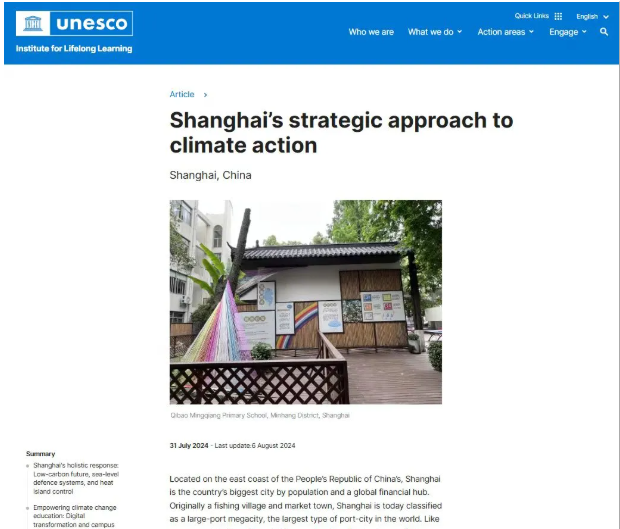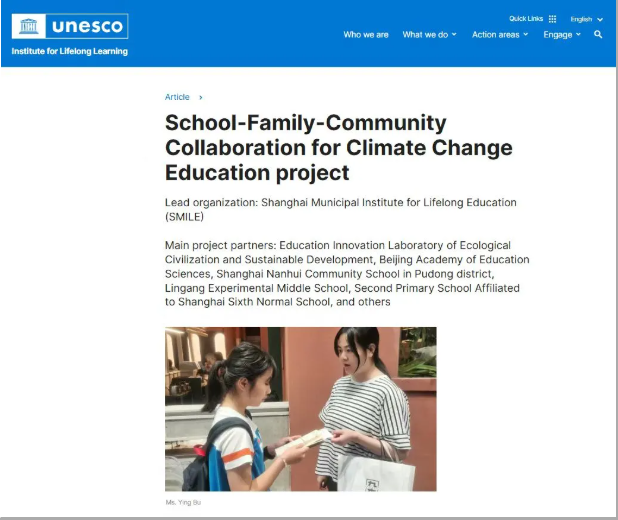East side of 7th Floor, No. 3663, North
Zhongshan Road, Shanghai, China, 200062
Tel: +86 21 6223 2322
www.smile.ecnu.edu.cn

Recently, the UNESCO Institute for Lifelong Learning (UIL) released the results of Shanghaiinnovation in climate change education on its website.
At present, climate change education has become a pressing global issue. In the context of the Shanghai Municipal Master Plan (2017-2035), Shanghai has introduced policies such as the Shanghai Action Program for Climate Change Adaptation(2024-2035) to actively and continuously respond to the challenges posed by climate change, such as rising sea levels, increased typhoonfrequency, rising temperatures and changes in precipitation patterns. Among them, education is regarded as a key tool for addressing climate change, an important way to raise public awareness of climate change and their ability to cope with it, and an important component of strengthening climate action.

It is understood that Shanghai, as a member of UNESCO’s Global Network of Learning Cities(GNLC) since 2019, has been serving as a leading city in the Education for Sustainable Development (ESD) Global Cluster, demonstrating its leading role in the international climate change education field. In this context, commissioned by the Shanghai Municipal Education Commission, Shanghai Municipal Institute for Lifelong Education (SMILE) focuses on innovating and deepening climate change education, organizing and motivating lifelong educators in Shanghai to participate in the research on “School-Family-Society Collaboration on Climate Change Education”, exploring and promoting local original educational experience, actively participating in global dialogues and governance,and devoting itself torealizing the Sustainable Development Goals (SDGs).
Since 2023, SMILE has been working with research institutes, educational institutions at all levels, enterprises and social organizations tofoster practical and theoretical innovation in climate change education. The project is a year-round, multi-year education program that advocates cross-disciplinary cooperation and lifelong learning, emphasizes the importance of lifelong learning for everyone, expands the coverage of climate change education to all ages, builds a tripartite collaborative education system among schools, families and society, expanding the benefits and realizing long-term valuethrough their cooperation. This practice not only demonstrates Chinese sense of responsibility in education, but also highlights the broad vision and innovative spirit of Chinese educators.

Two parts of this series of research findings have been selected as exemplary outcomes by UNESCO’s Global Research Alliance for Learning Cities and theUNESCO Institute for Lifelong Learning, and they will be globally promoted on the official website. Thus, global climate governance will be continuously advanced by publicizing Shanghai’s results.
It is understood that the SMILE of East China Normal University is promoting the establishment of an interdisciplinary liberal arts laboratory for Climate Change Education. It has hosted a number of academic symposiums, established a research alliance for Climate Change Education, and taken the lead in releasing Guidelines for Climate Change Education(Chinese and Englishversions). It is about to publish China’s Action on Climate Change Education in both Chinese and English. Researchers in SMILE have shared Shanghai’s achievements in a series of academic activities organized by the UNESCO Global Network of Learning Cities, have been invited to record thematic courses for relevant international organizations, and promoted the participation of more universitiesfor the aged, community colleges, primary and secondary schools, enterprises, public institutions and other organizations in Shanghai in climate change education.
This summer, in the 10th year of the “Hello Summer Vacation!” program organized by SMILE, more than 100 primary and secondary schools in Beijing, Shanghai, Changzhou, Jinhua, Hefei, Shenzhen and Kunming supported students to participate in a variety of climate change education programs during the summer by working with families and communities. Li Jiacheng, Executive Vice President of SMILE, said that SMILE along with the Liberal Arts Laboratory will continue to deepen the research on climate change education, form an autonomous practice system and an autonomous knowledge system, strengthen international dialogues and exchanges, and contribute China’s wisdom and strength to build a sustainable future.
Author: Yang Yining, Li Jiacheng
Source: China Education NewsWeb